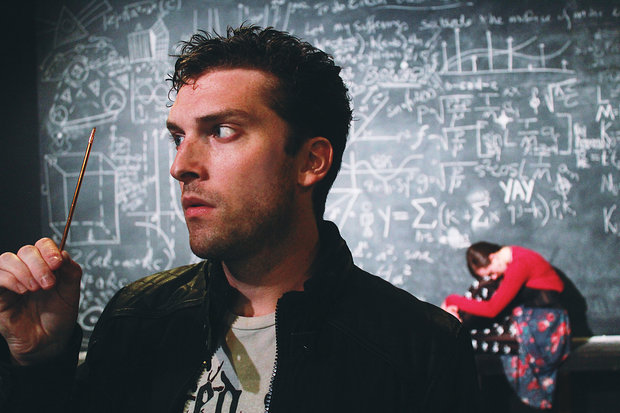
Noted director and critic Harold Clurman maintained that theater essentially “tells lies like truth.” That’s certainly what writer Lucas Hnath does a lot of in Isaac’s Eye. He has Isaac Newton and Robert Hooke as the scientist equivalents of the antagonistic music composers in Amadeus.
Using literary components made popular by Brecht and production devices by his director Erwin Piscator, Hnath accomplishes epic theater’s purpose: to make us think. But are we led mainly to consider the workings and conclusions of science or mainly of ambitious men?
A narrator (played with gusto by Tony Stopperan) sets the 17th Century scene with its state of science and a plague spreading from London. Chalking on a huge blackboard, he helps us separate truths from fictions, while constantly reminding that the play before us is not reality but something fictitious. Yet falsity makes positive outcomes possible.
Hnath introduces Newton with his ambitions and Hooke with his scientific accomplishments. These will form the nucleus of their antagonism.
As Newton, Ben Williamson oozes self-importance and desire for lasting worldly fame. On his own terms, no less. He aspires to be a member of the Royal Society that will get him respect and a fellowship, meaning he needs Hooke’s recommendation. Hooke (intense Robby May, the villain who steals the show and probably final pity for his character) isn’t one to relinquish an iota of his position in science.
When the two antagonists meet, they battle over their scientific methods and their accomplishments. The most important basis for their fight is the question of how light works. Newton is intuitively sure it makes a wave of various colors. Hooke says a conclusive experiment must show it’s not just a mess of particles. To test Newton’s creative intuition against Hooke’s insistence on scientific verification, they use Sam, dying of plague, to let his tear duct be pierced by a needle so he can tell how it affects his perception of light changes. Sam soon dies alone, wishing his life would be known as having served a purpose. This introduces a motif that parallels Newton’s conflict between his ambition for lasting fame and that of primarily having a happy life in company with a loved one. Kimberly Stephenson’s right-on Catherine loves him but wants marriage and children. Hooke is also attracted to her, thus rivaling Newton in fulfilling his romantic and sexual desires. (Catherine’s attraction to Hooke seems little motivated by Hnath but Stephenson makes the best of it.)
How Newton submits to his eye experiment constitutes a climactic episode that surprises. He and Hooke engage in mutual blackmail before and after, with each one willing to destroy the other’s work and reputation. Unfortunately, the experiment and its aftermath take so long that the play stretches about twenty useless minutes--much of them repetitious. Still, Isaac’s Eye is mostly engaging and does make us think. But it’s not Brechtian epic theater in the political sense, that is, that we will try to do something about our conclusions.
Director Vincent Carlson-Brown moves the actors very well both physically and emotionally (though he might gainfully suppress Act II’s melodramatic music). All make Hnath’s contemporary language fit both past action and present significance. Urbanite’s small quarters adapt well to a three-quarter round presentation that brings us right into the action. The production fittingly ends Urbanite’s stunning summer debut program.
